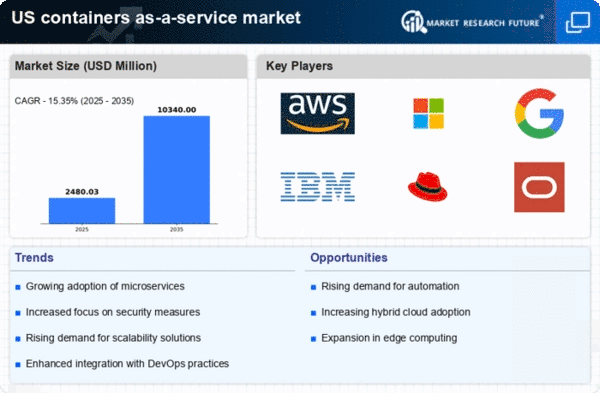Growing Demand for Scalability
The containers as-a-service market is experiencing a notable surge in demand for scalability solutions. Organizations are increasingly seeking flexible infrastructure that can adapt to fluctuating workloads. This trend is particularly pronounced in sectors such as e-commerce and finance, where rapid scaling is essential to meet customer expectations. According to recent data, the market for scalable cloud solutions is projected to grow at a CAGR of 25% through 2026. This growth is driven by the need for businesses to deploy applications quickly and efficiently, allowing them to respond to market changes. As a result, service providers in the containers as-a-service market are enhancing their offerings to include more robust scaling capabilities, thereby attracting a wider range of clients who prioritize agility and responsiveness.
Rising Focus on DevOps Practices
The containers as-a-service market is witnessing a rising focus on DevOps practices, which emphasize collaboration between development and operations teams. This trend is reshaping how organizations approach software development and deployment, fostering a culture of continuous integration and delivery. By utilizing containers, teams can create consistent environments that enhance collaboration and reduce deployment errors. Recent surveys indicate that organizations implementing DevOps practices experience a 20% increase in deployment frequency. This shift towards DevOps is driving demand for containers as a service, as businesses seek solutions that support their agile methodologies and improve overall operational efficiency.
Cost Efficiency and Resource Optimization
Cost efficiency remains a pivotal driver in the containers as-a-service market. Organizations are increasingly recognizing the financial benefits of adopting containerization technologies, which allow for better resource utilization and reduced operational costs. By leveraging containers, businesses can minimize infrastructure expenses, as they require fewer resources compared to traditional virtual machines. Recent studies indicate that companies utilizing containers can achieve up to 30% savings in operational costs. This financial incentive is compelling for many organizations, particularly startups and SMEs, which often operate under tight budget constraints. As the containers as-a-service market continues to evolve, service providers are focusing on delivering cost-effective solutions that enable clients to optimize their resource allocation while maintaining high performance.
Enhanced Development and Deployment Speed
The containers as-a-service market is significantly influenced by the need for enhanced development and deployment speed. Organizations are increasingly adopting containerization to streamline their software development processes, allowing for faster time-to-market. This acceleration is crucial in competitive industries where innovation is key to success. Data suggests that companies utilizing containers can reduce deployment times by as much as 50%, enabling them to respond swiftly to customer demands and market trends. As a result, service providers in the containers as-a-service market are prioritizing features that facilitate rapid application development and deployment, thereby attracting businesses looking to gain a competitive edge through agility and efficiency.
Increased Interest in Multi-Cloud Strategies
The containers as-a-service market is benefiting from an increased interest in multi-cloud strategies among organizations. As businesses seek to avoid vendor lock-in and enhance their operational flexibility, they are turning to multi-cloud environments that leverage the strengths of various cloud providers. This trend is particularly relevant in industries that require high availability and disaster recovery solutions. Data indicates that approximately 70% of enterprises are adopting multi-cloud strategies, which in turn drives demand for containers as a service that can seamlessly operate across different cloud platforms. Service providers are responding by developing solutions that facilitate interoperability and management across diverse cloud environments, thereby positioning themselves favorably in the containers as-a-service market.
















